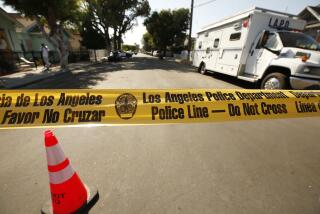Stand By False-Alarm Plan
- Share via
Fines, permits and public education have failed to stop more than 300 false burglar alarms a day from swamping the understaffed Los Angeles Police Department. That’s why the Police Commission this year approved a tough new policy that would shift responsibility for determining whether an alarm was real from taxpayer-supported police officers to the private companies that install the alarms.
Now the City Council, heavily lobbied by alarm companies and their customers, wants the commission to scrap the new policy for a compromise that is more political than practical: more fines, more permits and more education.
The commission should hold the tougher line.
Under the old policy, still in effect for now, police respond to all burglar alarms, 92% of which turn out to be set off by cats, wind, faulty wiring and such other causes. The commission’s so-called verified response policy would dispatch cops to an alarm only after a private patrol, video camera inspection, neighbor or someone else verified signs of a break-in.
Under the task force compromise, homeowners would be allowed three false alarms over 12 months before police required the alarm company to confirm an alarm. Homeowners would be fined for all false alarms instead of being allowed two free ones, as they are now. They would have to pay for a city alarm permit, which is required now but ignored by about half of the estimated 300,000 alarm owners in Los Angeles. And City Hall would step up efforts to educate the public about the costs of false alarms, which take up officer time, waste fuel, risk accidents and -- worst of all -- erode officer caution.
Private security companies did agree to take on some new responsibilities. But on the whole, the compromise largely tracks recommendations made in December by the local alarm industry association.
If the city can collect fines, enforce permits and convince homeowners to learn about their alarm systems, false alarms might cost taxpayers a bit less than they do now. But Portland, Ore., and other cities that have tried these approaches haven’t seen false-alarm rates drop.
Cities that have tried verified response, such as Salt Lake City, have not only fewer false alarms but faster police response. No longer swamped by all that bogus beep-beep-beeping, cops can give real break-ins the attention they deserve.
More to Read
Sign up for Essential California
The most important California stories and recommendations in your inbox every morning.
You may occasionally receive promotional content from the Los Angeles Times.










